| Srl | Item |
| 1 |
ID:
090175
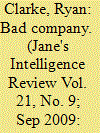

|
|
|
|
|
| Publication |
2009.
|
| Summary/Abstract |
While the militant threat continues to preoccupy security forces in India and Pakistan, organised crime remains an ongoing threat to state stability, particularly D Company, the major regional criminal organisation.
|
|
|
|
|
|
|
|
|
|
|
|
|
|
|
|
| 2 |
ID:
173973


|
|
|
|
|
| Summary/Abstract |
Violence seems on the rise. After centuries of declining homicide rates in the Global North, violence has been transforming since the 1960s and even increased in some parts. In the Global South, in contrast, levels of violence have remained constantly high. The article questions both the liberal peace theory lately highlighted by Steven Pinker as well as Marxist accounts on the relationship between capitalism and increasing violence, lately dubbed accumulation by dispossession. This article elaborates a heterodox Keynesian model of capitalist growth in which growth ultimately depends on rising real wages. Following this Kaleckian model of capitalism, money plays a pivotal role regarding the low propensity for violence in capitalist societies: capitalist credit money tends to alter the matter of dispute from non-divisible to divisible and thus functions as a general denominator for social conflicts. Conflicts in capitalism are about ‘more or less’ instead of ‘either/or’. In the Global South, in contrast, capitalism is too weak to structure the economic sphere as economic rents predominate. Rents tend to favour social closure and social verticalization. They are particularly prone to violence. Inasmuch as economic rents penetrate capitalist societies, violence will be increasing in the Global North as well.
|
|
|
|
|
|
|
|
|
|
|
|
|
|
|
|
| 3 |
ID:
106609
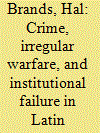

|
|
|
|
|
| Publication |
2011.
|
| Summary/Abstract |
This article examines the current crisis in Guatemala as a case study in the phenomenon of "criminal insurgency" in Latin America. Since the close of Guatemala's civil war in 1996, crime-especially violent crime-has increased dramatically, to the point that drug traffickers, organized crime syndicates, and youth gangs are effectively waging a form of irregular warfare against the state. The police, the judiciary, and entire local and departmental governments are rife with criminal infiltrators; murder statistics have surpassed civil-war levels in recent years; criminal operatives assassinate government officials and troublesome members of the political class; and chunks of territory are now effectively under the control of criminal groups. All this has led to growing civic disillusion and eroded the authority and legitimacy of the government. Rampant crime is causing a crisis of the democratic state.
|
|
|
|
|
|
|
|
|
|
|
|
|
|
|
|
| 4 |
ID:
131143
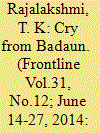

|
|
|
|
|
| Publication |
2014.
|
| Summary/Abstract |
The gang rape and murder of two minor girls in Uttar Pradesh brings to the fore factors such as cast dynamics and police apathy behind the growing crimes against women.
|
|
|
|
|
|
|
|
|
|
|
|
|
|
|
|
| 5 |
ID:
097744
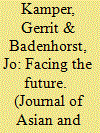

|
|
|
|
|
| Publication |
2010.
|
| Summary/Abstract |
This study focuses on the impact of social change on the black youth of post-apartheid South Africa. It is argued that adolescents' perspectives on their future in this country are of particular relevance due to the extent of social problems which are currently experienced in South Africa. With South Africa's history of apartheid and discrimination, it emerges that the influence of traditional cultural norms and values on the black youth is slowly but surely diminishing. They tend to share the general consumerism of South Africa's wealthy classes, and many lack the history of participation in the struggle for political freedom. Amidst severe social problems, such as poverty, unemployment, HIV/AIDS and violent crime, the findings of an empirical investigation into the views of 391 black adolescents from a variety of socio-economic backgrounds indicate that a general spirit of optimism and independence exists, paired with a strong desire to escape the trappings of poverty and the inferiority of the past.
|
|
|
|
|
|
|
|
|
|
|
|
|
|
|
|
| 6 |
ID:
129115


|
|
|
| 7 |
ID:
146382


|
|
|
| 8 |
ID:
142969


|
|
|
| 9 |
ID:
129929


|
|
|
|
|
| Publication |
2014.
|
| Summary/Abstract |
After summarising the evidence about the surge in violent crime that afflicted the industrialised West from the 1960s to the 1990s, Guido G Preparata reviews the principal explanations advanced by scholars. He construes the crime wave as a singular release of violent energy related to an epochal/generational break, due to the condition of economic and political bodies.
|
|
|
|
|
|
|
|
|
|
|
|
|
|
|
|
| 10 |
ID:
109922


|
|
|
|
|
| Publication |
2011.
|
| Summary/Abstract |
The paper addresses the dilemma of developing appropriate policing methods for effective intervention in countries where the objective is to create humane, sustainable governance adhering to the rule-of-law but where conflict is still continuing, often directed at members of the international community themselves. In both bilateral and multilateral international interventions there is confusion about what local police can contribute. The author argues that the comparative advantage of the police vis-à-vis the military is not to become 'little soldiers', doing proactive counter-insurgency. Instead, their comparative advantage is to respond to the security needs of individuals, thus contributing to the legitimacy of struggling local governments. This role has been accepted in contemporary writing by military experts on counter-insurgency and it also reflects research on the essential role police can play in counter-terrorism and the prevention of ordinary crime. In order to implement this strategy, a training curriculum is suggested.
|
|
|
|
|
|
|
|
|
|
|
|
|
|
|
|
| 11 |
ID:
157433
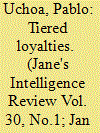

|
|
|
| 12 |
ID:
107830
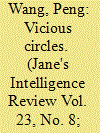

|
|
|